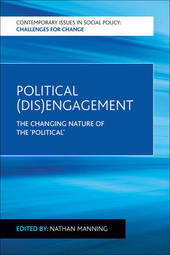
|
Political (Dis)Engagement: The Changing Nature of the 'Political'
Paperback / softback
Main Details
| Title |
Political (Dis)Engagement: The Changing Nature of the 'Political'
|
| Authors and Contributors |
Edited by Nathan Manning
|
| Series | Contemporary Issues in Social Policy |
|---|
| Physical Properties |
| Format:Paperback / softback | | Pages:276 | | Dimensions(mm): Height 234,Width 156 |
|
| ISBN/Barcode |
9781447317029
|
| Classifications | Dewey:322.4 |
|---|
| Audience | | Professional & Vocational | |
|---|
| Illustrations |
No
|
|
Publishing Details |
| Publisher |
Bristol University Press
|
| Imprint |
Policy Press
|
| Publication Date |
18 January 2017 |
| Publication Country |
United Kingdom
|
Description
In what ways is the meaning and practice of politics changing? Why might so many people feel dissatisfied and disaffected with electoral politics? In this important book academics from a range of disciplines join with political activists to explore the meaning of politics and citizenship in contemporary society and the current forms of political (dis)engagement, providing a timely interdisciplinary dialogue and interrogation of contemporary political practices.
Author Biography
Nathan Manning is a Lecturer in Sociology at the University of York, UK. He is particularly interested in examining how citizens understand their relationship to politics and the role that emotions and feelings may play in people's experience of 'the political'.
Reviews"An excellent contribution to the growing literature on alternative forms of political participation, at a time when too many see young people especially as apathetic and uninvolved."--David Marsh, University of Canberra, Australia "In contrasting traditional with new, everyday forms of digital participation, this book engagingly raises challenging questions about whose experiences and identities are included, and also who is increasingly excluded or disengaging from both new and old politics."--Ariadne Vromen, University of Sydney, Australia "This is a very important book which both reminds us of ways of thinking about politics that have been submerged in recent decades and urges us to think more imaginatively about new ways of being political. Anyone interested in the revitalization of democratic politics should read this book."--Stephen Coleman, University of Leeds, UK
|